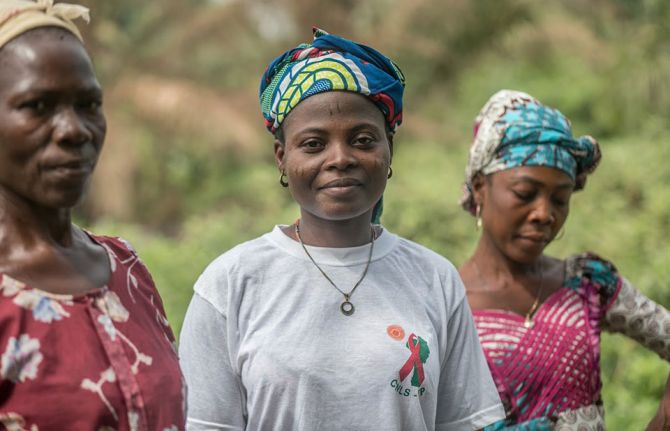

Feature Story
Addressing inequalities to end AIDS: 10 years to 2030
10 June 2021
10 June 2021 10 June 2021HIV is fuelled by inequalities. A panel, Addressing Inequalities to End AIDS: 10 Years to 2030, held on the sidelines of the United Nations High-Level Meeting on AIDS on 9 June, brought together a passionate mix of grass-roots activism and experience, academic wisdom, evidence-informed strategic guidance and experience from United Nations Member States and UNAIDS to discuss this urgent issue.
All the panellists underlined the need for urgent, evidence-informed and transformative action to unlock social enablers and to end the social, economic, racial and gender barriers—which include punitive laws, policies and practices, stigma and discrimination based on HIV status, sexual orientation and gender identity, and other human rights violations—that create and deepen the inequalities that perpetuate the HIV pandemic. They shared strategies and action for ending the HIV epidemic based on lived experience and backed by lessons from four decades of the HIV response.
The panellists underlined lessons from HIV and COVID-19 that have shown the world that unless all countries, communities and individuals access the benefits of science and technology without stigma and discrimination, benefit from fair taxation and equitable distribution of wealth and are respected in all their diversity, epidemics will continue to rage.
The participants heard that six out of seven new adolescent HIV infections in sub-Saharan Africa are among girls—Winne Byanyima, the Executive Director of UNAIDS, noted that this was because of inequalities of power. The participants also heard, though, that strong political commitment to ensure that prevention services were available at the community level, with a special focus on reaching adolescent girls and young women and their partners, saw Eswatini successfully meet its HIV prevention targets.
Jeffrey Sachs, a professor at Columbia University, in the United States of America, reminded the participants that well laid out goals and time-bound and evidence-informed plans must be matched by adequate financing, without which poorer nations and poorer communities even within rich nations will not enjoy good health and well-being.
The powerful testimony of Abhina Aher, a transgender activist from India, spoke of the multiple, intersecting and dynamic inequalities faced by a person who does not conform to the social norms of mainstream Asian society.
Thanks @benphillips76 let’s unite to end inequalities #HLM2021AIDS #HLMAids2021 https://t.co/bhwY7nf0UZ
— Abhina Aher (@meisabheena) June 9, 2021
All the participants underlined the centrality of enabling laws and policies and of the need for comprehensive sexuality education to empower young people to make informed decisions about relationships and sexuality and navigate a world where gender-based violence, gender inequality, early and unintended pregnancies, and HIV and other sexually transmitted infections still pose serious risks to their health and well-being.
Interventions from representatives of the Bahamas, Germany, Mexico, Spain and the United Kingdom of Great Britain and Northern Ireland underlined the urgency of an HIV response that addresses gender inequalities and protects and enables human rights.
In summary, it was concluded that inequalities both feed and drive the HIV epidemic as well as other diseases, but that inequalities should be fought with the right policies, strategies and legislation in order to end AIDS by 2030 and at the same time strengthen pandemic preparedness.
Quotes
“Universal health coverage will not be achieved without sexual and reproductive health and rights. We need to ensure interventions that safeguard women’s and girls’ right to their own bodies and lives, which includes access to safe and effective contraceptives and HIV testing without third-party consent.”
“Giving communities accurate information about HIV, encouraging relationships that empower women and men to make healthy decisions and addressing some of the social norms that discriminate against women and girls can finally put an end to HIV-related stigma and discrimination.”
“We have the tools and services that can prevent people from being prey to stigma and discrimination. What we need is not new knowledge, what we desperately need is a different politics to guarantee that everyone, everywhere has an equal and appropriate right to health and dignity. I am a transwoman, a woman of colour, blind in one eye, a woman without a womb or vagina, Asian, and also a former sex worker. You peel one layer and there are more layers for discrimination based on my gender, sexuality, sexual orientation, profession—inequalities that can impact my life and my access to HIV services.”
“In a pandemic—AIDS, COVID-19 and beyond—viruses feed on inequalities. When we ignore inequalities, virus spread in the shadows and we get outbreaks. So, we have to ask: are young women seeing the same reductions in new infections as others? Do gay and transgender communities have the same viral suppression? Do the poor have access to the same HIV technologies and easy access to care? The United Nations has not, in the past, focused enough on inequalities. We are shifting. From now on, we will measure success by how fast the inequality gaps are narrowing. Leaders don’t really have much of a choice: you can either fight inequalities or fail on ending AIDS.”



